How to Find Files and Folders on Linux
Unless you lot're a perfectionist whose files are all diligently labeled and organized, chances are y'all've had to search for a file at least one time in your life. If you're a new Linux user, y'all might be wondering how to find files on Linux. The good news is there are several ways to do it, which means that everyone can choose the method that suits them best.

Generally speaking, there are two types of apps that help you lot detect files and folders on Linux. The offset are those that search the alive filesystem every time. The 2d type are apps that build an index of files, and so perform searches on the index. In this article yous'll notice a balanced mix of both, and you can combine them depending on your needs.
How to Find Files in the Terminal
Yes, I know…you're not a fan of the control-line interface. That'southward absurd – keep reading and you'll find apps that are more than to your liking. Notwithstanding, don't call up you can escape the commands. About of the apps on this list are only graphical interfaces for find and/or locate, so you'll still exist using them, only not directly.
discover
Permit's first with the almost important command. Notice is i of the essential Linux utilities. It looks for a string in the directories you've set according to parameters ("switches") that you've included. This case:
find /home/username/Documents -iname "writ*" -type f
ways that yous're performing a example-insensitive (-iname) search for files (-blazon f) in the Documents folder, and their filenames begin with "writ". Equally you tin can see, observe supports wildcards, and you lot can also employ them to discover files by their extension (for example, "*.pdf" to notice all PDF files in a binder).

Y'all tin can search for empty files with the -empty option, or find files past size and modification time. Find supports regular expressions, and if you desire to search file contents, you lot can combine information technology with grep. To learn more, cheque the official documentation (or just blazon man observe in the last).
locate
Locate uses a different approach. It relies on the updatedb utility which creates a database of your files and periodically updates it via cron scheduling. This lets locate know which files are currently present on your filesystem. You lot can also update the database manually whenever yous want.
Locate tin can search for files by name, and you can use wildcards and regular expressions in your query. For example:
locate -ei chow.cfg
will listing the paths to all existing (-e) files chosen "grub.cfg". The -i option stands for "instance-insensitive". If you don't know the full name of the file y'all're looking for, only type a part of it, and locate will display all files with the word in their name.

whereis
This command has a very specific purpose, so y'all probably won't use information technology every day. Whereis shows you the location of the source, binaries, and user manuals for a given awarding. This means you lot won't run whereis when y'all want to notice a random text file. Yous will, however, use information technology when you lot demand to check where GIMP or Firefox keep their configuration and executable files.

You can run whereis without any options to get a list of all files, or add switches for their respective functions (-b for binaries, -s for source, and -g for manuals).
How to Use a File Managing director to Find Files
Nigh file managers for Linux can filter files past name or perform basic searches. If yous don't need any advanced parameters, this is a quick method that does the chore.
Nautilus
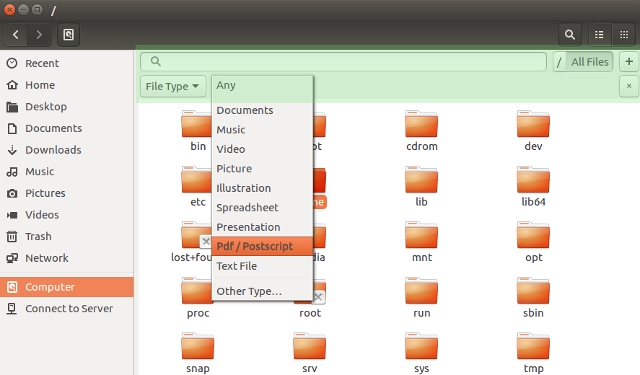
Access the search function (highlighted in green on the screenshot) past pressing Ctrl+F or by clicking the magnifying glass icon in the toolbar. The search is case-insensitive, then you don't have to worry about capitalizing your queries. You tin filter files by type and location, although the latter is somewhat limited in terms of what you tin can adjust.
Dolphin
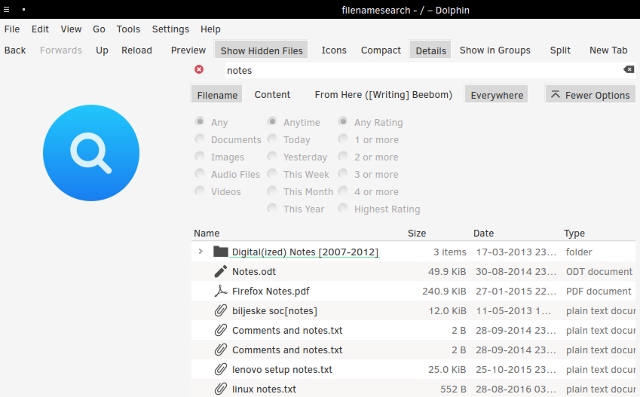
Dolphin's search responds to the aforementioned keyboard shortcut (Ctrl+F), or yous can open up it from the Edit card. It lets you filter files by name, content and location (current binder or the whole filesystem). If you lot take enabled file indexing with Baloo, Dolphin will be able to find files by type and modification engagement.
Krusader
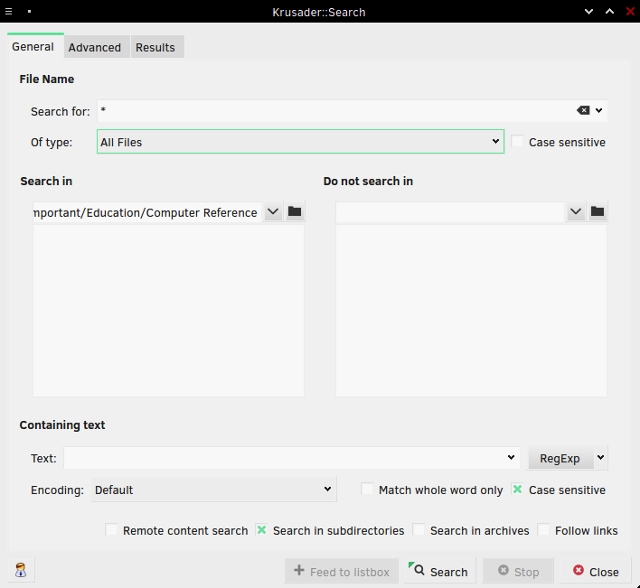
Krusader is popular among KDE users every bit a Dolphin alternative thanks to its affluence of avant-garde options. Krusader's file search functionality is two-fold: it works as a GUI for both find and locate commands.
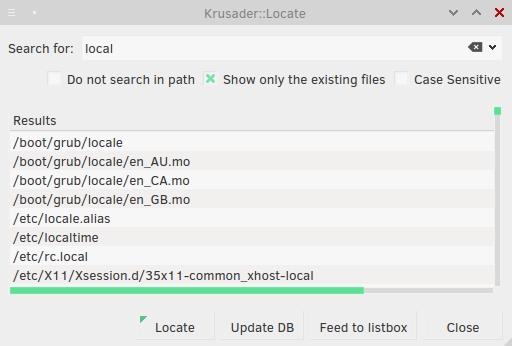
The former lets yous tweak many details, such every bit file type, included or excluded directories, size, ownership, and file permissions. Krusader can search for keywords within files and fifty-fifty archives (like Zippo and TAR), and you can use regular expressions to customize your query. If you lot've never tried Krusader, now is the fourth dimension to give it a hazard.
Thunar
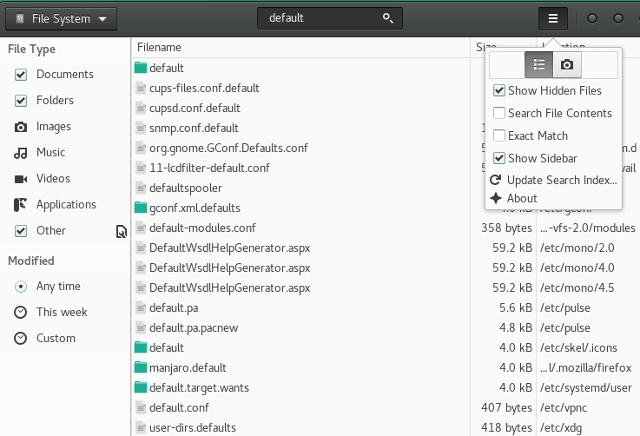
Thunar integrates with the file search utility called Catfish to provide fast nonetheless detailed results. You can filter files by type and modification date, and search file contents as well as their names. Catfish supports fuzzy (incomplete) filename matching, so you don't take to know the exact proper noun of the file you're looking for.
How to Search for Files with Launchers
Launchers are usually used for, well, launching apps. Nevertheless, you can also apply them to find files by enabling various plugins. They're quick and practical – you lot simply start typing and the results popular correct up. In that location are many launchers for Linux; we'll focus on just a few examples.
Kupfer
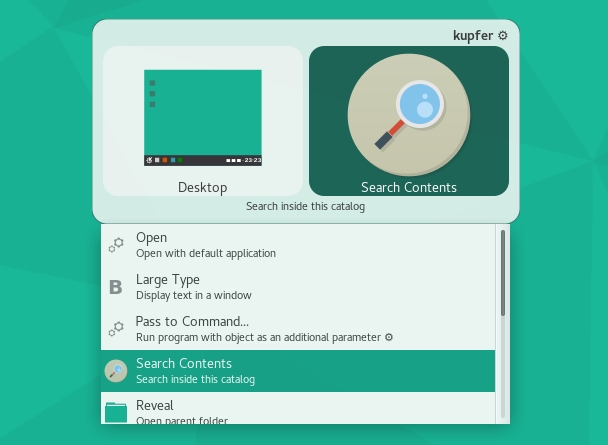
Kupfer is a simple launcher available in the repositories of Debian, Ubuntu, Fedora, and Curvation Linux. It comes with a bunch of plugins that permit y'all find files with the locate command, and information technology tin can create its own catalog of indexed folders.
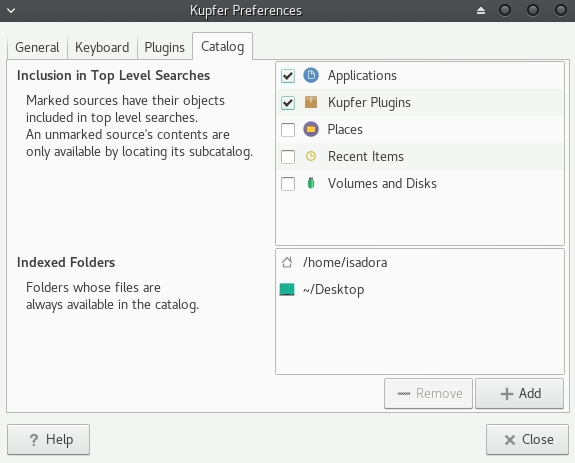
Kupfer is an action-based launcher. After typing in your search keyword, Kupfer will list actions that you can perform on/with the results. These depend on the plugins you've enabled, and y'all can activate them by selecting them in the drib-downwards menu.
KRunner
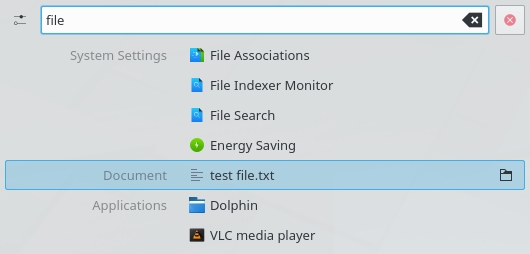
KRunner is the default KDE launcher that you can configure in the System Settings – Plasma Search dialogue.
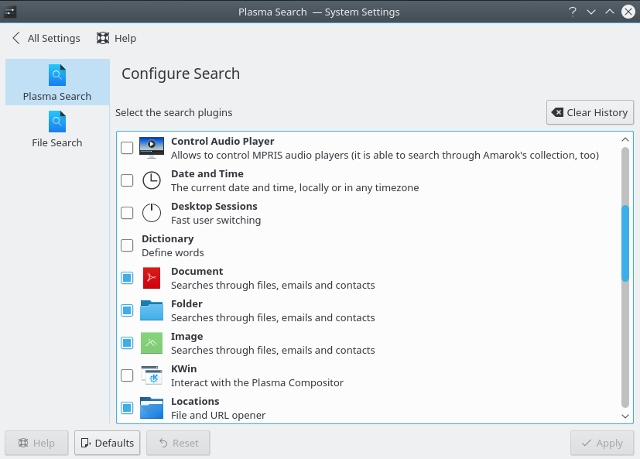
Like Kupfer, it supports numerous plugins that aid you not merely find files, but besides interact with other Linux applications and parts of the Plasma desktop environment. KRunner can search YouTube and Wikipedia, bear witness your recent documents, observe files by blazon, and much more than.
Albert
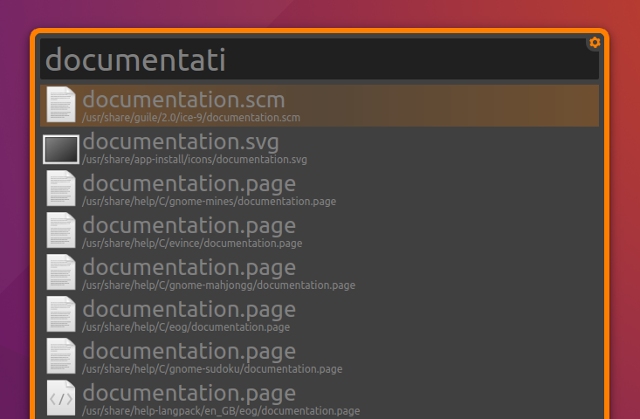
Albert is inspired by the Alfred launcher for Bone X. Although it looks simple, Albert has plenty of options to play with. It too has – you guessed it – plugins, with "Files" being the near of import here.
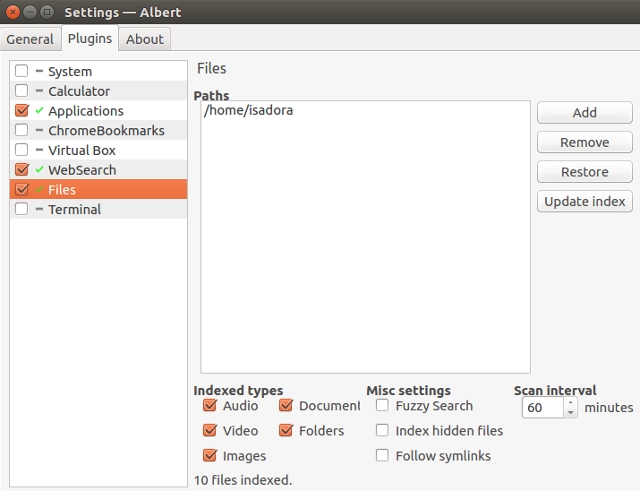
This plugin lets you create an index of directories that Albert will monitor and rely on. You tin can enable fuzzy (incomplete) matching and choose which types of files should be indexed. To find files, simply run Albert past pressing the designated keyboard shortcut and start typing your query.
Mutate
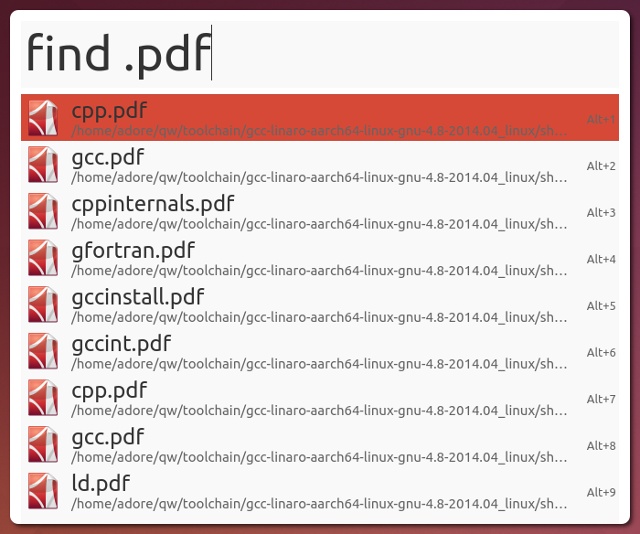
Some other Alfred-inspired launcher for Linux, Mutate doesn't take as many options every bit Albert. Withal, information technology features multiple search types, including file search. You can look for files by name and by file extension. The Preferences dialogue is somewhat unusual, because it shows which scripts Mutate is using, but doesn't allow you configure much apart from keywords and keyboard shortcuts.
Finding Files with Specialized Linux Apps
And so far nosotros've covered mostly uncomplicated file search solutions. They're great for everyday lookups, but not and so useful when information technology comes to complex queries and file contents search. If you demand something more than powerful, consider the following suggestions.
GNOME Search for Files
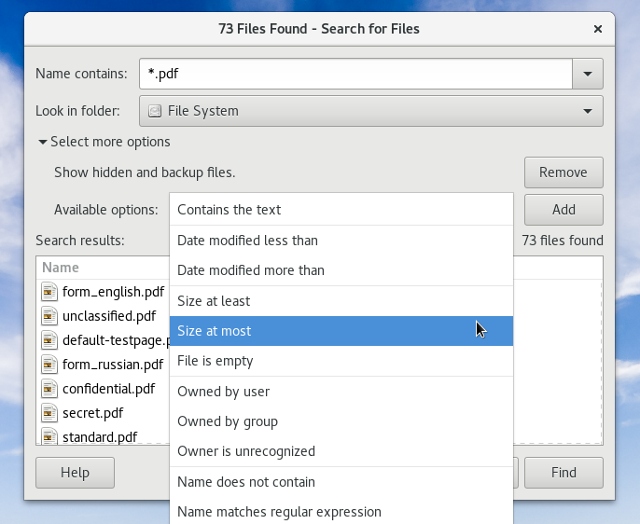
In case GNOME Search non installed on your distribution, expect for the gnome-search-tool packet in the repository. GNOME Search is powered by locate, find, and grep commands, and supports wildcards as well as partial filename matching. You can combine multiple search options by choosing them from the drop-down card and clicking "Add together".
KFind
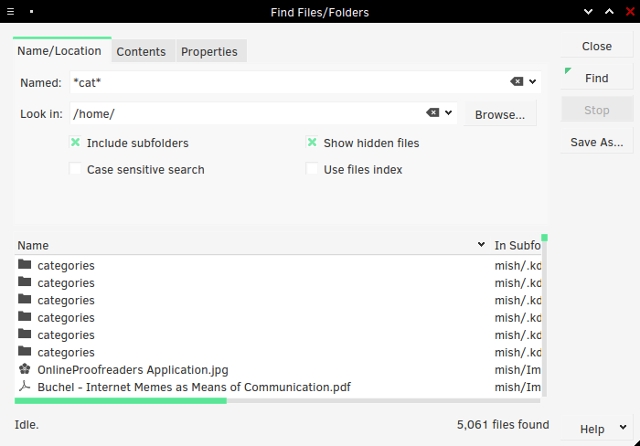
KFind is the KDE equivalent of GNOME Search with a few extra options. It can search for filenames or file contents, and if yous've enabled file indexing on your KDE organization, it can search the index to speed up the process. The options are divided into tabs, and the last tab ("Properties") lets you notice files by size, modification date, and ownership. Apart from regular expressions and wildcards, KFind supports the question marker as a stand-in for a single graphic symbol in your query. For example, searching for "no?es" will detect files named "noses", "notes", "nodes", and and so on.
Unity Dash
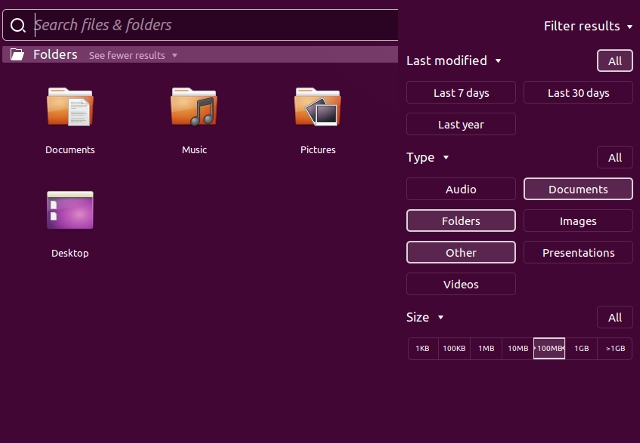
Ubuntu users true-blue to the Unity desktop will be familiar with the Dash. Unity Nuance is capable of finding your files and folders according to several parameters (filename, modification appointment, file type, size). To extend its functionality, you can install various Unity Scopes and Lenses. They integrate external services into Dash, enabling it to search for your browser bookmarks, Google Docs files, web history, and more.
SearchMonkey
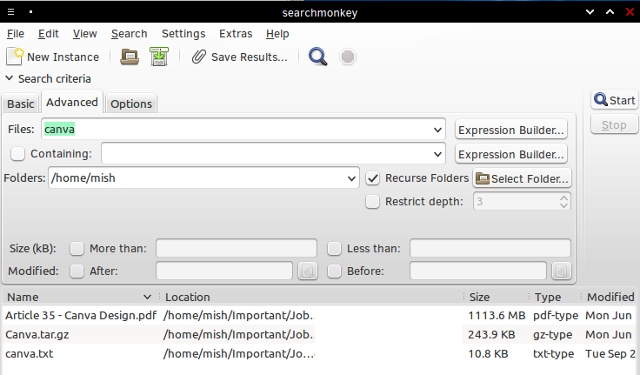
SearchMonkey is a relatively old, merely yet completely functional desktop search app. Regular expressions are its principal focus, and information technology has a "Test Regular Expression" tool that helps you build them. SearchMonkey supports all the essential search parameters (filenames, modification engagement, size, and file contents), plus the pick to restrict the recursive search depth to a selected number of folders.
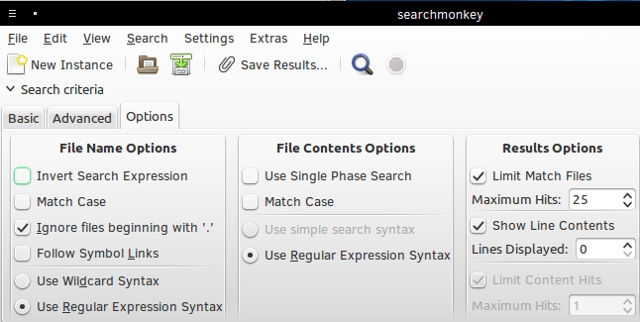
Yous can also salvage search results every bit a CSV file and limit the amount of results for every query.
DocFetcher
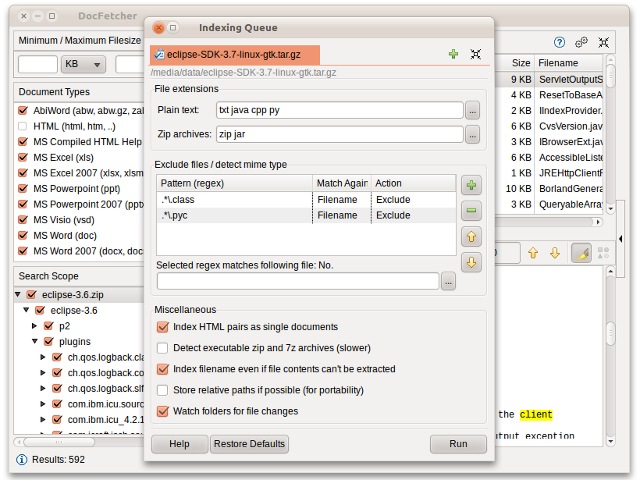
DocFetcher is a desktop search engine for people who often need to search for file contents instead of just filenames. Call up researchers, students, and other users who work with large collections of text-based files. DocFetcher beginning builds a database of files and folders that you cull. This database is automatically updated whenever DocFetcher detects that y'all've modified the files.
When searching for files, y'all can filter them past type and size, or employ regular expressions for fine-grained queries. DocFetcher can search within PDF, EPUB, HTML, RTF, and Role files, as well as within archive files (ZIP, TAR, 7z…) and even Outlook emails.
One peachy thing virtually DocFetcher is that it has a portable version, then you tin carry your database and the app on a USB stick and utilise information technology anywhere.
Recoll
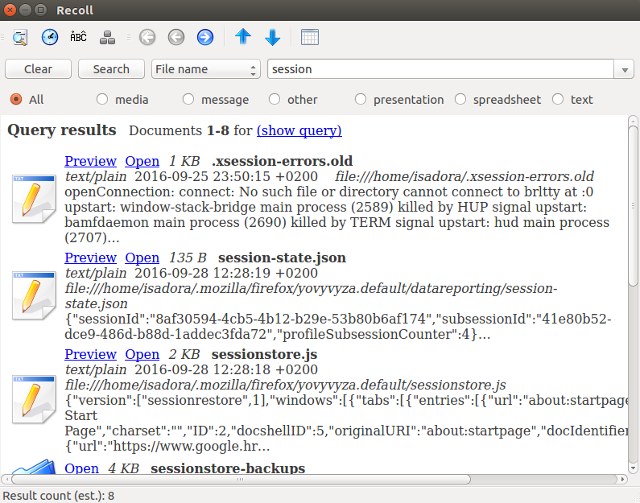
Recoll is probably the about powerful desktop search engine for Linux. It's similar to DocFetcher: yous utilise it to search through file contents. On offset run, information technology volition prompt you to create an index of files. You can select which directories and file types will exist indexed, and limit files past size. Recoll will and so ready an update schedule and then that the index is always synchronized with the actual files. If you want, y'all tin can create multiple file indexes and search for files only in one, or in all of them.
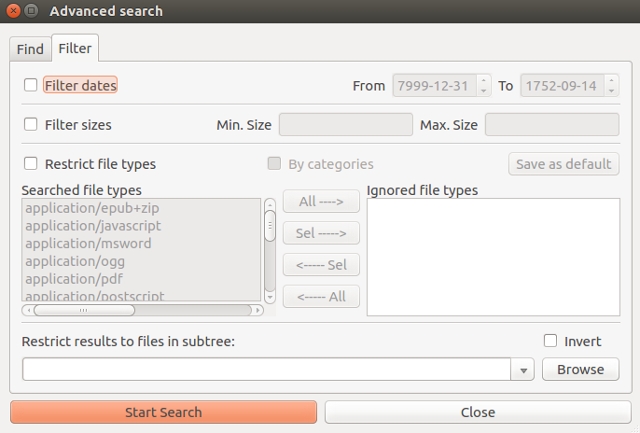
You can look up files by name or search for keywords within files. Recoll lets yous filter results by several criteria. Information technology can too show related or similar files, search for phrases within files, and recognize give-and-take forms thanks to support for stemming. This means that you lot tin can search for "work", and the results will include files that contain "working", "worked", "workers"…
Supported file formats include regular text files, logs, man pages, HTML, PDF, CHM, RTF, DJVU, and EPUB files, Libre and Microsoft Office files (including Excel and Powerpoint documents), TAR, RAR, 7z and Null archives. Note that external libraries or helper utilities might be required for some of them.
Meet Too: How to Sync Your OneDrive Business relationship on a Linux Computer
Since most file search tools support the same options, choosing one is largely a matter of convenience, or deciding what works all-time for your typical workflow. This list might seem long, but there are more file search utilities for Linux. We'll mention ANGRYsearch, a new projection that strives to be the fastest search tool. And what virtually y'all? Practise you lot know whatsoever other apps for finding files on Linux? What practice you use – and can y'all share some tips? Let usa know in the comments.
Prototype credits: Mutate screenshot, DocFetcher screenshot
Source: https://beebom.com/how-find-files-folders-linux/
Posted by: mcgaughtheyeary.blogspot.com


0 Response to "How to Find Files and Folders on Linux"
Post a Comment